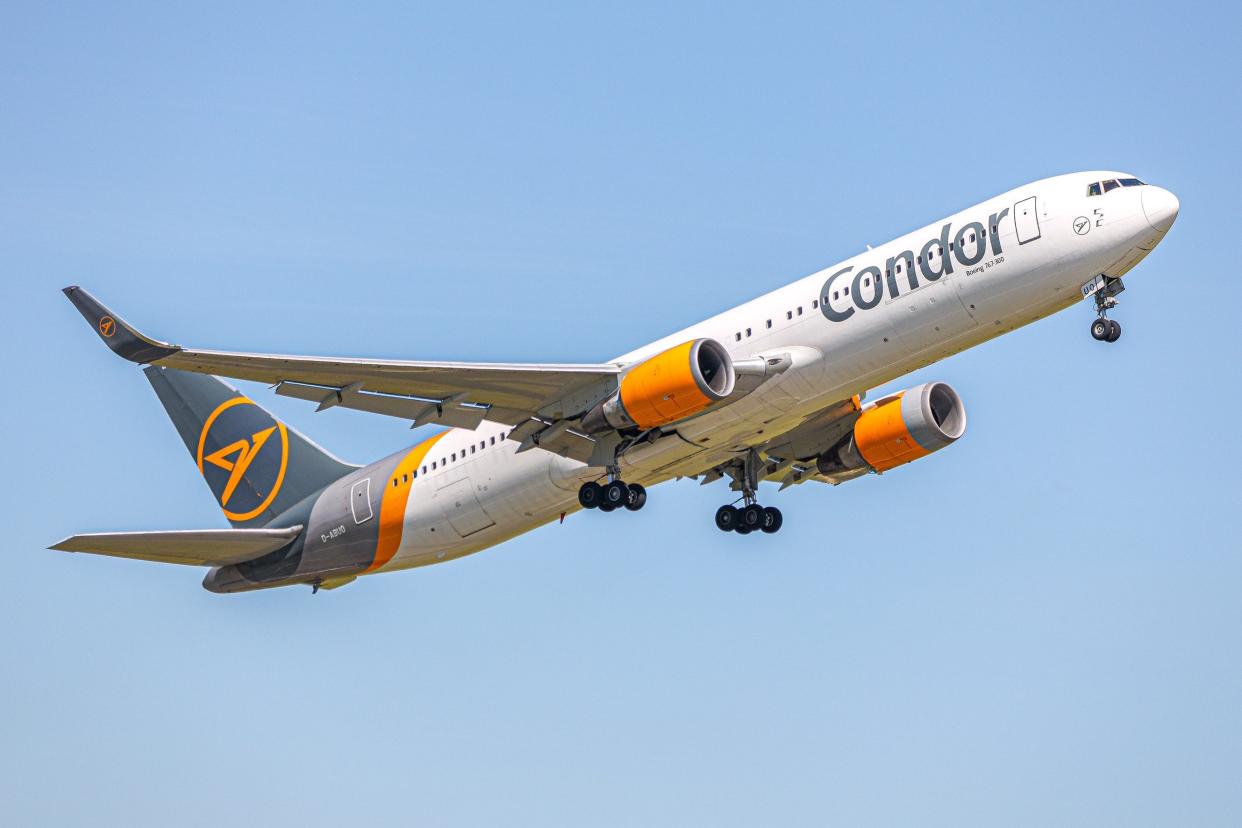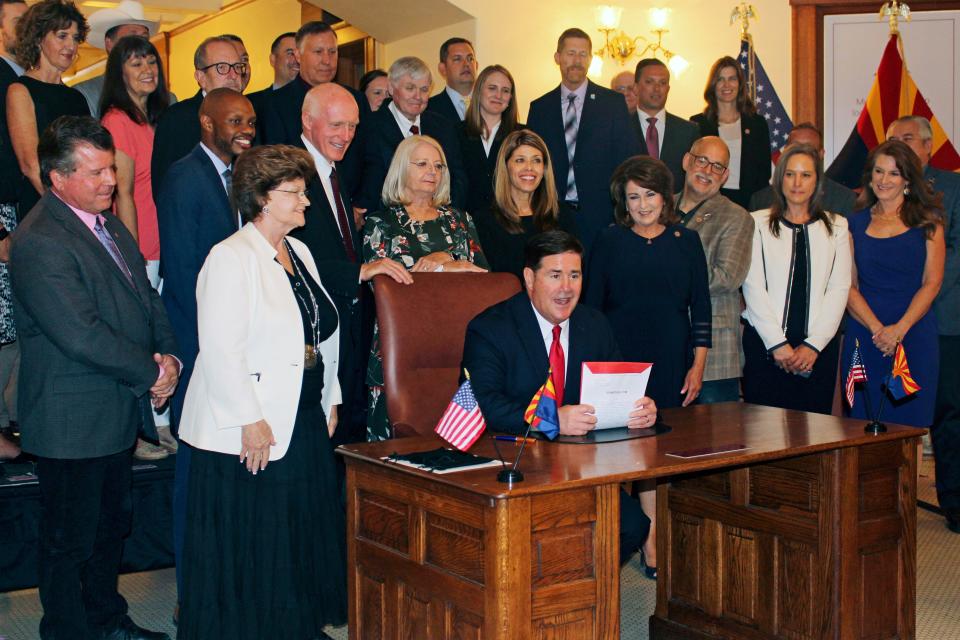14 AZ lawmakers took 9-day Europe trip sponsored in part by lobbyists and more are coming

- Oops!Something went wrong.Please try again later.
Arizona lawmakers earn a $24,000 annual salary, but sometimes there are perks.
Last month, 14 Arizona lawmakers took a free trip to Germany, where they celebrated the opening of a trade office in Frankfurt, met government and business officials, and enjoyed a leisurely weekend in Berlin.
Lobbyist firms and state taxpayers funded the lawmakers' expenses as part of a new, $750,000 Arizona House of Representatives international relations program that will fund more such trips over the next few years. Officials said they see the trips as an investment that's likely to reap benefits as foreign businesses and visitors come to Arizona.
House officials were was unable to provide individual and total costs to send the lawmakers on the trip a week after The Arizona Republic requested the information; officials said they hoped to share that information soon.
Spouses of the lawmakers were allowed to join the lawmakers but had to pay their own airfare. Before going to Germany, several members of the delegation also went to Italy, where they met Cindy McCain, who works as U.S. Ambassador to the United Nations Agencies in Rome.
House Speaker Rusty Bowers, an east Mesa veteran lawmaker who was defeated by his Republican opponent in the Aug. 2 primary election, said he learned a lot on the trip.
"All the time it was go-go-go," Bowers said of the Germany trip. "It was a firehose experience."
He and his wife went to both Italy and Germany, he said.
An agenda of the nine-day trip obtained by The Republic shows participants had plenty of down time, too. Only two days involved meetings that lasted for more than two hours, the agenda shows.
Bowers said some "drinking and partying" took place in the evenings that he didn't participate in, but overall, members got valuable knowledge and made connections on the trip that could eventually bring big business to Arizona.
"We want to encourage trade worldwide to come to Arizona, and at times there will be travel," he said. "I hope it will be more of a staple of the Legislature to be involved internationally."
The trip may well have had trade benefits, but lawmakers should still take care to avoid a perception that they're receiving gifts that could influence their policy making, said John Pelissero, senior scholar in government ethics at the Markkula Center for Applied Ethics at Santa Clara University in California.
The number of lawmakers and that they could take their spouses seemed excessive to Pelissero, who called the trip a "junket."
"It's never wise for them to accept gifts from lobbyists" who are being paid to "get legislation that will benefit their clients," he said. "It can affect the public's trust in the state Legislature."
Promoting Arizona abroad
The Phoenix Committee for Foreign Relations, a nonprofit company that boosts international political and economic collaboration, coordinated airfare and hotel expenses for the lawmakers. The committee is an independent, nonpartisan, 46-year-old nonprofit agency that began as an offshoot of the New York Council on Foreign Relations, according to its website.
Over the next year, the committee will promote Arizona's "international reputation," host foreign dignitaries and plan overseas trips, among other tasks, with the goal of supporting the House's Office of International Affairs and establishing "an appreciation of foreign affairs" in the state.
Specifically, the committee will bring nine foreign delegations to the state, send three legislative delegations to other countries, and coordinate events, trade groups, government officials and business people to forward the goal, according to the one-year, $750,000 agreement signed on Aug. 2 by Bowers and the committee's president, Claire Sechler Merkel.

The House has the option to extend the program when it expires in July 2023.
Tina Waddington, the nonprofit's executive director, declined comment about the trip and referred questions to the House's Office of International Affairs. Andrew Wilder, spokesman for the Republican majority of the House, said legislative staff are working to compile the costs of the recent trips and all of the sponsors.
The public-private partnership between the House and the Committee on Foreign Relations, a "trusted and experienced" nonprofit, will identify "countries and regions that can complement Arizona's growing economy, as well as building productive relationships with foreign leaders," Wilder said.
The 2022 budget passed by the Legislature includes an additional $250,000 from the state's general fund to pay for the Frankfurt trade office; the Legislature approved the money last year, but the funds shifted to this year. The budget also includes $250,000 for a trade office in Israel, and $500,000 for continued operation of three trade offices in Mexico.
Gov. Doug Ducey mentioned the Frankfurt trade office in his annual International State of the State Address in March, noting that international companies "are projected to create 18,000 new jobs and $19 billion in capital investment," including the $12 billion Taiwan Semiconductor Manufacturing Co. facility rising in north Phoenix.
Ducey traveled to Taiwan and the Republic of Korea in late August to "strengthen" relations even further with the countries.
Benefits to the Arizona Legislature from the Italy and Germany trip may not materialize for some time. Five of the 14 lawmakers who went on the trip did not win their primary election and won't return to office next year. Democratic Sen. Rebecca Rios and Reps. Lorenzo Sierra, Cesar Chavez, Daniel Hernandez, plus Bowers, a Republican. A sixth Democrat who went on the trip, Diego Espinoza, resigned after winning the primary.
Also going on the trip were Democrat Reps. Brian Fernandez and Amish Shah; and six Republicans, Sens. Sine Kerr and T.J. Shope; and Reps. Tim Dunn, Frank Carroll, Quang Nguyen and Justin Wilmeth.
'Diplomats for the state of Arizona'
Wilmeth, chair of the House Office of International Relations, came up with the idea for the Germany trip and selected who would go. He didn't want to be "jerk" and disinvite people who then lost their primary elections, he said, adding that the experience those lawmakers had also will benefit Arizona.
The lawmakers "acted as diplomats for the state of Arizona" and had meetings "almost every day," he said. "I didn't want to make it just a junket kind of thing."
Following the Italy trip that some of the members took part in, the full group arrived in Frankfurt on the afternoon of Aug. 24. The next day, they toured Merck KGaA's facility in Darmstadt in the morning and met with officials at the Frankfurt trade office in the late afternoon.
A subsidiary of Merck, EMD Electronics, announced earlier this year it would open a $28 million gas-and-chemical factory in Chandler that would support local semiconductor manufacturing.
The group traveled to Berlin on Aug. 26, where they with with U.S. embassy officials for an hour before a reception with hors d'oeuvres, followed by dinner. After a free weekend in Berlin, the group met for an hour with the Federal Foreign Office before taking a train back to Frankfurt.
The lawmakers' busiest day was Aug. 30, when they toured the legislature (Landtag) of the state of Hesse before meeting with servicemembers at the U.S. Army base in Wiesbaden. The last business day involved a two-hour meeting with Peter Beuth, the Interior Minister of Hesse, where the group talked about policing and security at large events.
Fernandez, who represents parts of Yuma, said he hopes to make contacts with German weapons manufacturers who might use the Yuma Proving Grounds, boosting the local economy.
"I made some good connections," he said.
A few of the lawmakers posted about the trip on Twitter, but no news release announced it to the public.
Lobbyist funding helped pay for trip
In addition to public money, expenses were underwritten by lobbyist groups including Arizona Contractors' Association, Pivotal Policy Consulting, Public Policy Partners, the Greater Phoenix Chamber, and others. At least 16 lobbyist-sponsors went on the trip. Former lawmaker and gubernatorial candidate Aaron Lieberman was one of those; he didn't return a call about the trip.
Wilmeth said he "fundraised like crazy" to try and defer costs to the state for the Germany trip. He views paying for the excursion is no different than when lobbyists fund other activities, like paying for a dinner. That doesn't mean lawmakers are beholden to the sponsors, he said, adding that he doesn't change his votes as a lawmaker just because someone might buy a "steak dinner" or pay for a trip.
Wilmeth said he didn't coordinate or fundraise for the Italy portion of the trip.
Lobbyist-funded travel isn't illegal in Arizona; travel is not considered an improper "gift" to lawmakers under state law as long as it's properly disclosed.
Several lawmakers who went on the trip, including Bowers, Wilmeth, Kerr, Chavez and Hernandez, reported travel was paid by outside sources to other states or countries in their annual financial disclosure forms. For example, Bowers reported travel to Romania and Kazakhstan to meet government officials in 2021; Chavez and Hernandez reported trips to El Salvador to work as election observers.
Lobbyist disclosures for the Italy and Germany trips should show up in their third-quarter disclosure reports to the state, due at the end of the month.
Meghaen Dell’Artino, owner of Public Policy Partners, said she helped sponsor the Germany portion and doesn't even know which lawmakers went. When Wilmeth pitched her for it, she thought of a diplomatic visit to Vietnam she took as part of an American Council for Young Political Leaders program that she found truly "eye-opening."
Funding the 14 lawmakers was "paying it forward," she said.
The Greater Chamber of Phoenix put $5,000 toward the trip, said the group's president and CEO, Todd Sanders. Mike Huckins, the Chamber's vice president for public affairs, went with the delegation.
"For us, it was a no-brainer" to participate, Sanders said, noting the meeting with Merck as particularly important.
The Chamber's PAC contributed $1,000 to Wilmeth's reelection campaign in July, but Sanders said that's "completely different" than what the Chamber itself funds.
Steve Voeller, vice president of government and community relations at the University of Arizona, and Sabrina Vazquez, the university's chief lobbyist, also went on the trip.
Voeller said they were "invited" by the Legislature and Phoenix Committee on Foreign Relations to be a sponsor and travel with the lawmakers. A highlight, he said, was meeting with representatives of the German Chamber of Crafts and Industry during the Frankfurt trade office event, who explained how the German apprenticeship model works.
Reach the reporter at rstern@arizonarepublic.com or 480-276-3237. Follow him on Twitter @raystern.
Subscribe to azcentral.com today.
This article originally appeared on Arizona Republic: Arizona lawmakers took trip to Germany, funded in part by lobbyists

